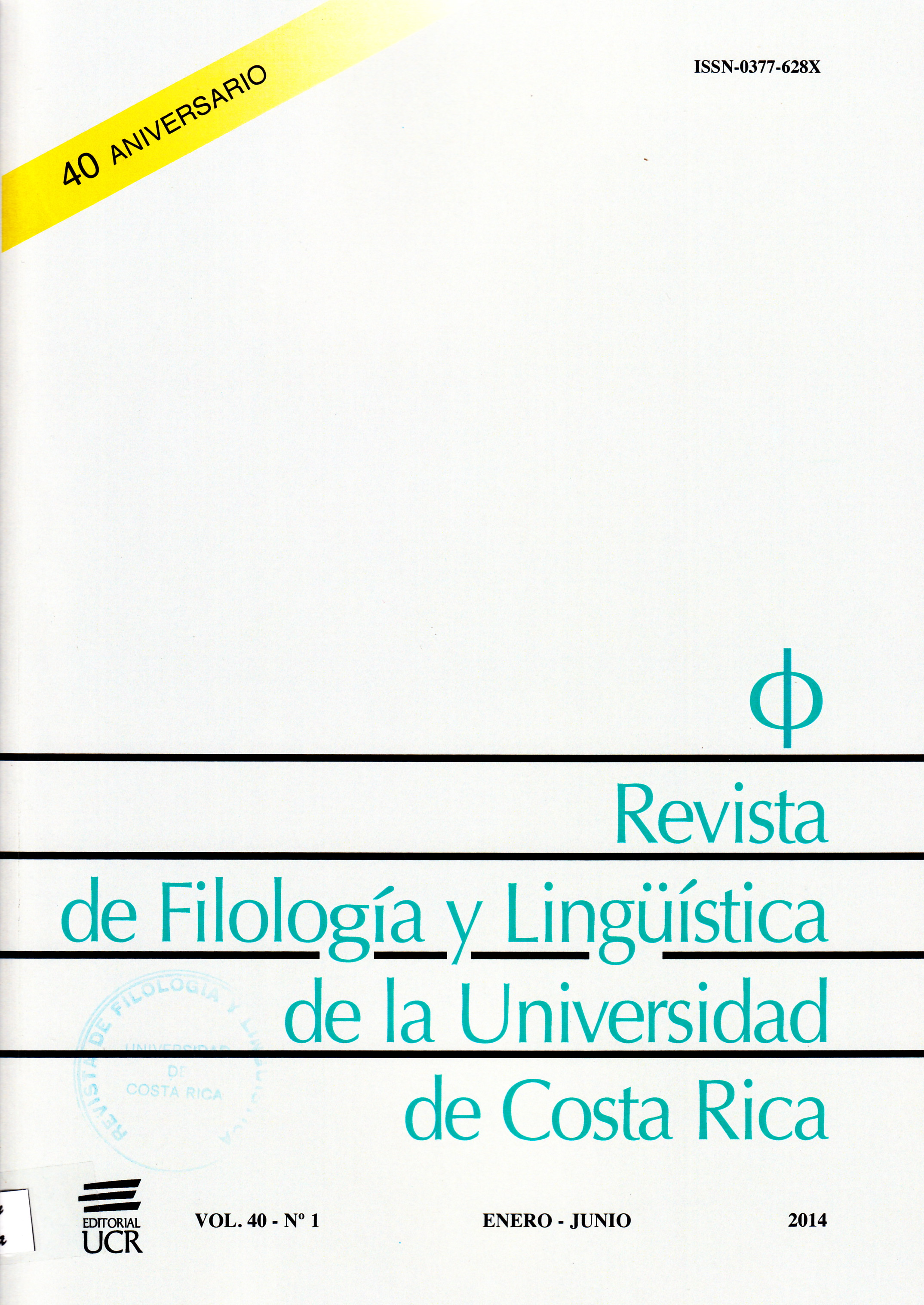Résumé
Este artículo analiza la así llamada ciencia ficción costarricense, en relación con el concepto de novum desarrollado por Darko Suvin. Se plantea la poética suviniana como referente para el análisis y construcción del género de ciencia ficción, en cuanto tal enfoque permite la elaboración de una ciencia ficción que aglutine el contexto empírico del escritor y las posibilidades ocultas tras tal contexto. Asimismo, se define la ciencia ficción como una literatura crítica, que en nuestra actual situación implica una crítica a la nomocracia posmoderna. De igual modo, se establece que la denominada ciencia ficción costarricense no es realmente ciencia ficción.
Références
Alfaro-Vargas, R. (2011). Capitalismo zombie. Contribución a la crítica del último capitalismo. Telos. Revista de Estudios Interdisciplinarios en Ciencias Sociales. 13 (3), 285-296.
Alfaro-Vargas, R. (2012). Henri Lefebvre y el fin de la nomocracia posmoderna. Revista de Ciencias Sociales. 3 (137), 105-121.
Antonio, R.J. (2012). After Neoliberalism. Wither Capitalism? Por G. Ritzer (Ed.). The Wiley-Blackwell Companion to Sociology. (567-587). Malden-Oxford: Wiley-Blacwell.
Apple, M.W. (2013). Can Education Change Society? Nueva York y Londres: Routledge.
Barceló-García, M. (2005). Ciencia y ciencia ficción. Revista Digital Universitaria. 6 (7): 1-10.
Casasa-[Núñez], L. et ál. (2009). Posibles futuros. Cuentos de ciencia ficción. San José: EUNED.
Castillo-[Rojas], M. et ál. (2011). Objeto no identificado y otros cuentos de ciencia ficción. San José: EUNED.
Chamu, A. et ál. (2010). Poe siglo XXI. Ciencia ficción costarricense. San José: Editorial Clubdelibros.
Chaves, J.R. et ál. (2013). Lunas en vez de sombras y otros relatos de ciencia ficción. San José: EUNED.
Chibber, V. (2013). Postcolonial Theory and the Specter of Capital. Londres: Verso.
Cramer, K. (2003). Hard science fiction. Por E. James y F. Mendlesohn (Eds.). The Cambridge Companion to Science Fiction. (186-196). Nueva York: Cambridge University Press.
Csicsery-Ronay, I.J. (2003). Marxist theory and science fiction. Por E. James y F. Mendlesohn (Eds.). The Cambridge Companion to Science Fiction. (113-124). Nueva York: Cambridge University Press.
Csicsery-Ronay, I.J. (2012). What Do We Mean When We Say “Global Science Fiction”? Reflections on a New Nexus. Science Fiction Studies. 39 (3), 478-494.
Fraser, N. (2013). Fortunes of Feminism: From State-Managed Capitalism to Neoliberal Crisis. Londres y Nueva York: Verso.
Freedman, C. (2000). Science Fiction and Utopia: A Historico-Philosophical Overview. Por P. Parrinder (Ed.). Learning from Other Worlds. Estrangement, Cognition and the Politics of Science Fiction and Utopia. (72-97). Liverpool: Liverpool University Press.
Friedman, M. (2010). Capitalisme et liberté. París: Leduc.s Éditions.
Gaskin, R. (2013). Language, Truth, and Literature. A Defense of Literary Humanism. Oxford: Oxford University Press.
Haywood-Ferreira, R. (2011). Presentación. Por M. Castillo et ál. Objeto no identificado y otros cuentos de ciencia ficción. (vii-xiii). San José: EUNED.
James, E. (2000). Before the Novum: The Prehistory of Science Fiction Criticism. Por P. Parrinder (Ed.). Learning from Other Worlds. Estrangement, Cognition and the
Politics of Science Fiction and Utopia. (19-35). Liverpool: Liverpool University Press.
Jara, L.E. (2010). El legado del cuervo. Por A. Chamu et ál. Poe siglo XXI. Ciencia ficción costarricense. San José: Editorial Clubdelibros.
Klein, G. (2000). From the Images of Science to Science Fiction. Por P. Parrinder (Ed.). Learning from Other Worlds. Estrangement, Cognition and the Politics of Science
Fiction and Utopia. (119-126). Liverpool: Liverpool University Press.
Malakolunthu, S. (2010). Implementation of Education Reform Policies: The Issue of Structural and Cultural Discordance. Por J. Zajda (Ed.). Globalisation, Ideology and Education Policy Reforms. (79-85). Dordrecht, Heidelberg, Londres, New York: Springer.
Molina-Jiménez, I. (2009). Venus desciende: relatos de ciencia ficción. Alajuela: Autor.
Molina-Jiménez, I. (2010). Género en construcción: la ciencia ficción costarricense. A propósito de la novela El vuelo del Ra, de Manuel Delgado. A Contracorriente. 8 (1), 408-415.
Molina-Jiménez, I. et ál. (2012). Marte inesperado y otros relatos costarricenses de ciencia ficción. San José: Grupo Nación.
Moreno, F.Á. (2006). La ficción prospectiva: propuesta para una delimitación del género de la ciencia ficción”. Por T. López-Pellisa y F.Á. Moreno (Eds.). Ensayos sobre
ciencia ficción y literatura fantástica. (65-93). Madrid: Asociación Cultural Xatafi y Universidad Carlos III de Madrid.
Moreno, F.Á. (2011). Recent Spanish Science Fiction and its Modes. SFRA Review. (297), 29-32.
Moylan, T. (2000). ‘Look into the dark’: On Dystopia and the Novum. Por P. Parrinder (Ed.). Learning from Other Worlds. Estrangement, Cognition and the Politics of Science Fiction and Utopia. (51-71). Liverpool: Liverpool University Press.
Nealon, J.T. (2012). Post-postmodernism or, The Cultural Logic of Just-in-Time Capitalism. Standford, CA: Standford University Press.
Parrinder, P. (2000). Introduction: Learning from Other Worlds. En Learning from Other Worlds. Estrangement, Cognition and the Politics of Science Fiction and Utopia.
(1-16). Liverpool: Liverpool University Press.
Petit-Pérez, M.F. y Solbes-Matarredona, J. (2012). La ciencia ficción y la enseñanza de las ciencias. Enseñanza de las ciencias. Revista de investigación y experiencias
didácticas. 30 (2), 69-86.
Quesada-Soto, Á. (2000). La narrativa costarricense del último tercio de siglo. Letras. (32), 17-43.
Ríos-Quesada, V. (2012). Prólogo. Por I. Molina-Jiménez et ál. Marte inesperado y otros relatos costarricenses de ciencia ficción. (7-9). San José: Grupo Nación.
Roberts, A. (2006a). Science Fiction. (2da ed.). Londres y Nueva York: Routledge.
Roberts, A. (2006b). The History of Science Fiction. Nueva York: Palgrave Macmillan.
Seed, D. (2011). Science Fiction. A Very Short Introduction. Nueva York: Oxford University Press.
Shippey, T. (2005). Hard Reading: The Challenges of Science Fiction. Por D. Seed (Ed.). A Companion to Science Fiction. (11-26). Malden-Oxford-Victoria: Blackwell.
Slusser, G. (2005). The Origins of Science Fiction. Por D. Seed (Ed.). A Companion to Science Fiction. (27-42). Malden-Oxford-Victoria: Blackwell.
Suvin, D. (1979). Metamorphoses of Science Fiction. On the Poetics and History of a Literary Genre. New Haven y Londres: Yale University Press.
Suvin, D. (2000). Afterword: With Sober, Estranged Eyes. Por P. Parrinder (Ed.). Learning from Other Worlds. Estrangement, Cognition and the Politics of Science Fiction and Utopia. (233-271). Liverpool: Liverpool University Press.
Westfahl, G. (2005). Hard Science Fiction. Por D. Seed (Ed.). A Companion to Science Fiction. (187-201). Malden-Oxford-Victoria: Blackwell.

